Home » Articles posted by drannalcox (Page 4)
Author Archives: drannalcox
The great remote work experiment – what happens next?

Sam Wordley via Shutterstock
Daniel Merino, The Conversation and Gemma Ware, The Conversation
In this episode of The Conversation Weekly, four experts dissect the impact a year of working from home has had on employees and the companies they work for – and what a more hybrid future might look like. And we talk to a researcher who asked people to sit in bathtubs full of ice-cold water to find out why some of us are able to stand the cold better than others.
For many people who can do their job from home, the pandemic meant a sudden shift from office-based to remote working. But after a year of working from home, some company bosses really don’t want it to become the new normal. The chief executive of Goldman Sachs, David Solomon, called it an “aberration”, and Barclays chief executive Jes Staley said it wasn’t sustainable, because of how hard it is to maintain culture and collaboration with teams working remotely.
Meanwhile, others are fully embracing a remote work future. Twitter said its employees could work from home forever, and Spotify announced a “work from anywhere” policy. Other firms are starting to announce more hybrid policies, where people are expected to split their week between the home and the office: in March, BP told employees they would be expected to work from home two days a week.
In this episode, we talk to researchers who have been studying the shift to remote working during the pandemic about their findings. In France, Marie-Colombe Afota, assistant professor in leadership, IÉSEG School of Management in France, talks us through the initial results of a new study she did in late 2020 of 4,000 employees at a large French multinational. “The more employees felt that the organisation generally values being visible in the office, the more they felt expected to be constantly available while in remote work,” says Afota. “And, in turn, two months later, the less they felt productive and happy in remote work.”
A year of working from home has left some people close to burnout, according to Dave Cook, a PhD researcher in anthropology at University College London who has been interviewing people about their experiences of shifting to remote work during the pandemic. “Burnout and work-life balance is the forgotten public health emergency that’s emerging through throughout this lockdown,” he tells us. And he says that companies should start communicating with their staff now about what the future has in store: “So their employees can get on with planning the rest of their lives.”
For others, the shift to remote work has been a surprisingly good experience. Jean-Nicolas Reyt, an assistant professor at McGill University in Montreal, has been tracking the language that chief executives in North America used to talk about remote working in 2020. “What you see is that actually that misconception, that telework is just not as efficient as co-located work, has vanished for a lot of CEOs,” he tells us. “A lot of CEOs and a lot of employees are saying it was forced, but it’s actually pretty good.”
Ruchi Sinha, a senior lecturer in organisational behaviour and management at the University of South Australia, gives the view from Australia, where hybrid working is already becoming a reality, and where most invitations to a face-to-face meeting now come with a video link too. But Sinha says that opportunities to shift to a fully flexible way of working may be being missed, with companies implementing new policies as rigid as the old ones. “I don’t think we are spending enough time thinking about are we giving people choice to shape their jobs, to shape what they do,” she tells us.
In our second story, we find out that your genes influence how resistant you are to cold temperatures. To test this, scientists asked a group of men to sit in bathtubs full of icy water to measure their reaction – and how much they shivered. Victoria Wyckelsma, a postdoctoral research fellow in muscle physiology at the Karolinska Institutet in Sweden, explains what they found and what it means.
And Sunanda Creagh from The Conversation in Australia gives us some recommended reading about the recent floods in Sydney.
Read more:
‘They lost our receipts three times’: how getting an insurance payout can be a full-time job
The Conversation Weekly is produced by Mend Mariwany and Gemma Ware, with sound design by Eloise Stevens. Our theme music is by Neeta Sarl. You can find us on Twitter @TC_Audio or on Instagram at theconversationdotcom. We’d love to hear what you think of the show too. You can email us on podcast@theconversation.com
A transcript of this episode is available here.
News clips in this episode are from CNN, CNBC News, CBC News, NBC News, Arirang News, World Economic Forum, Goldman Sachs, AlJazeera English, 7 News Australia, Sky News Australia,, Euronews, DW News and Jornal da Record.
You can listen to The Conversation Weekly via any of the apps listed above, our RSS feed, or find out how else to listen here.![]()
Daniel Merino, Assistant Editor: Science, Health, Environment; Co-Host: The Conversation Weekly Podcast, The Conversation and Gemma Ware, Editor and Co-Host, The Conversation Weekly Podcast, The Conversation
This article is republished from The Conversation under a Creative Commons license. Read the original article.
A review of ecological momentary interventions for mental health
The original vision of Ecological Momentary Interventions (EMI) – brief interventions delivered in the moment during daily life – were put forward over a decade ago. In the interim, the arrival of the smartphone has made these interventions far more feasible to deploy. At this point, it is timely to examine whether the original vision of these systems has been realised, and furthermore has the concept of EMI shifted to incorporate further possibilities opened up by these technologies? With Andreas Balaskas and Gavin Doherty, University College Trinity, and Stephen Schueller, University of California, Irvine, our new paper in PLoS ONE examines the components of EMIs in the smartphone era.
You can read more about it in this great blog post written by Andreas
A. Balaskas, S.M. Schueller, A.L. Cox & G. Doherty, Ecological momentary interventions for mental health: A scoping review, PLoS ONE, 16(3): e0248152, 2021. DOI 10.1371/journal.pone.0248152
Tips for crating 30 second videos of academic papers
In today’s lab meeting we reviewed a bunch of 30 second video previews from papers presented at previous @sig_chi conferences. Having listed what worked and what didn’t, we came up with a set of top tips. These were:
- Start and end with a title slide that includes the names of the authors.
- Think of the video as a trailer for the paper rather than something that has to cover all the content of the paper: focus on either the motivation and research question and leave the view wondering what the outcome is, or present the main/boldest/surprisin finding, or the contributions. But don’t try to do all of that in 30 seconds!
- Audio – choose narration with subtitles rather than only having a music backing track.
- Avoid just providing text on the screen and expecting the viewer to read it – not everyone can read at the same speed.
- Watch your speed – don’t speak too fast.
- Include video clips rather than only using a slide deck or still images. You can find creative commons video clips if you search for them.
- If your research is about an interface or system, include a videoclip of it.
- Get feedback on your video before publishing it
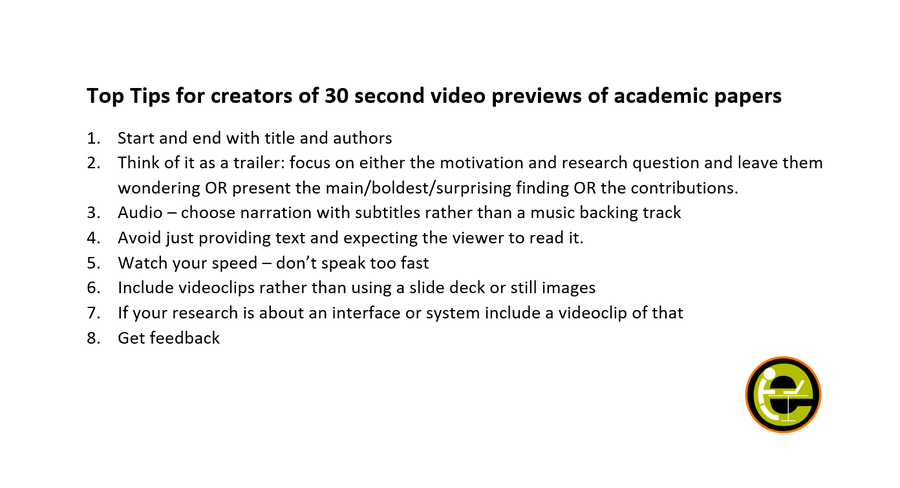
We shared our tips on twitter which many people seemed to appreciate. Mark Warner responded to say that I’d previously given him the advice to include a videoclip of the system he was recording when I had seen him practice a talk he was giving at CHI2019 and that he had found this useful.

Media interview: Deutsche Welle TV News
Dr Marta Cecchinato was interviewed by Deutsche Welle TV News , Germany’s international broadcaster on their show ‘The Day’ about our work on work-life balance during the pandemic.
Media interview: ‘If you switch off, people think you’re lazy’: demands grow for a right to disconnect from work
Prof Anna L Cox is quoted in The Guardian’s article ‘If you switch off, people think you’re lazy’: demands grow for a right to disconnect from work
Anna Cox achieves UK Council for Graduate Education recognition for excellence in PhD supervision
Prof Anna L Cox has been recognised by the UK Council for Graduate Education for excellence in research supervision practice.
You have produced a very rich submission, bristling with innovations and useful interventions that you have developed over many years as a research supervisor. You clearly enjoy supervision and have invested significantly in both your practice and your many students. We found your approach to developing employability to be a particularly rich mix of skills development and experiential opportunities. Your mature and considered approach to selecting examiners also stands out.
Examiner’s feedback
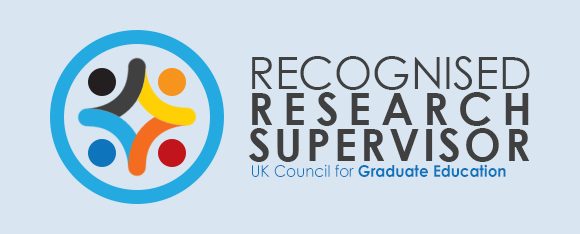
Media interview: KCBS Radio San Francisco
Dr Sandy Gould was interviewed by KCBS Radio San Francisco for their segment on virtual commutes following the article on our work in The Wall Street Journal Welcome to the Fake Office Commute (Turns Out People Miss the Routine)
Media interview: The Wall Street Journal
Prof Anna L Cox is quoted in The Wall Street Journal Welcome to the Fake Office Commute (Turns Out People Miss the Routine) By Jennifer Levitz
How the pandemic will shape the workplace trends of 2021
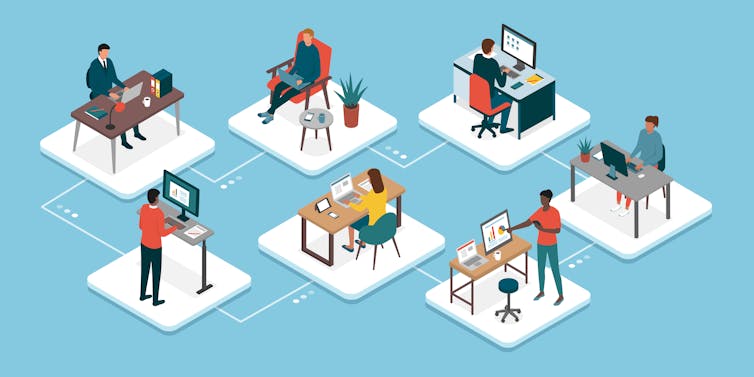
Elenabsl/Shutterstock
The economist John Maynard Keynes predicted in 1930 that the amount we work would gradually shrink to as little as 15 hours a week as technology made us more productive. Not only did this not happen, but we also began to spend extra time away from home due to commuting and suburban living patterns, which we often forget are recent historical inventions.
However, 2020 has changed all that. In my new history of remote work during COVID-19, I marvel at how much it has shaken up our lives and how much we took for granted. My research also points to a number of trends that will help shape working life in 2021.

Gene Daniels.
Over “in time for Christmas”
At the start of 2020 remote work was a gradually rising long-term trend. Only 12% of workers in the US worked remotely full time, 6% in the UK. Naturally the world was unprepared for mass remote work.
But COVID-19 instantly proved remote work was possible for many people. Workplace institutions and norms toppled like dominos. The office, in-person meetings and the daily commute fell first. Then the nine to five schedule, vacations and private home lives were threatened. Countries even started issuing remote work visas to encourage people to spend lockdown working in their territory.
As old norms vanished, a rapid procession of novel technologies marched uninvited into our homes. We had to master Zoom meeting etiquette, compassionate email practices, navigate surveillance, juggle caring responsibilities. The list goes on.
In the face of grim statistics – the UN predicted 195 million job losses – only the tone deaf complained about working from home. Nonetheless, COVID-19 created the biggest remote work experiment in human history.
In July, UK prime minister Boris Johnson – with Edwardian optimism – daydreamed a sense of normality would return “in time for Christmas”. Fast forward through summer to lockdown 2.0 and the fantasy of a 12-week experiment faded into sepia tinged memories. One interviewee joked: “I really thought we’d be back in the office by July, what fools we were!”
Are you disciplined?
Silicon Valley companies Google, Apple and Twitter were among the first to announce employees could work from home. Ahead of the curve, they were well practised. Predictably, they already had a fancy term for it: distributed working. In 2021 concepts such as distributed and hybrid working will proliferate.
Most were less prepared than Silicon Valley. In March, I published findings from a four-year research study tracking remote workers. I warned, to be a successful remote worker deep reserves of self-discipline were required, otherwise burnout followed.
We understand this now. But I spent the first lockdown patiently explaining to news outlets why working from home was so hard. When I suggested returning to the office might be considered a luxury – because it helped people structure their days – a news presenter laughed. For good or ill, conversations about disciplined routines will intensify in 2021.
Read more:
Remote working: the new normal for many, but it comes with hidden risks – new research
By May 2020 many reported experiencing Zoom fatigue. I naively predicted Zoom use would subside.
I’d have been right if we’d returned to the office. Instead necessity dictated we up our Zoom game – even if they were draining. Zoom simultaneously saved and ruined working from home, and it’s not going away anytime soon.
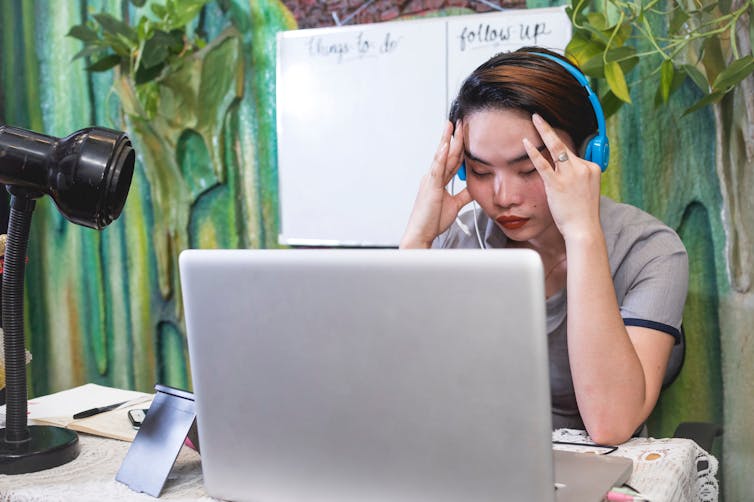
Michael D Edwards/Shutterstock
The commuting paradox
Remote workers, grateful to still have jobs, also reported a gnawing sense of survivors’ guilt. Overwork was one way of expressing this guilt. Many felt working extra hours might secure their job.
In April 2020, I joined other academics researching work-life balance on a project called eWorkLife. The research data revealed increases in working hours when it wasn’t obvious when the working day ended. Especially with no obvious signal to end the working day.
In my four-year remote study, I had noticed a strange pattern. Participants initially said “escaping the commute” was a key benefit of remote working. Yet months later these same workers started recreating mini commutes.
The eWorkLife project uncovered similar findings. People wanted to create “a clear division between work and home”. Study lead Prof Anna Cox urged people to do pretend commutes so they could maintain a work-life balance. In 2021 work-life balance must become recognised as a public health issue and the eWorkLife project is urging policymakers to act.
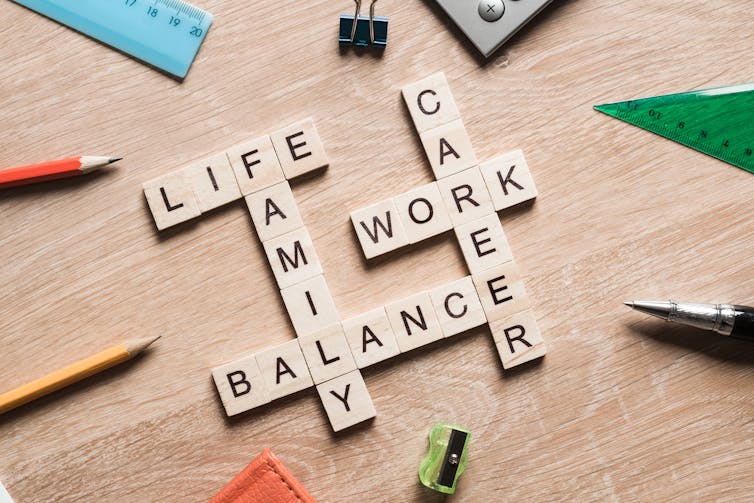
Khakimullin Aleksandr/Shutterstock
The right to disconnect
What’s happened to the time previously lost to commuting? Many are using it to catch up on admin and email. This taps into a worrying trend.
Pre-pandemic warnings about an encroaching 24/7 work culture were intensifying. Social scientists argued that contemporary workers were being turned into worker-smartphone hybrids. In 2016, French workers were even given the legal right to disconnect from work emails outside working hours.
A hopeful wish-list for 2021 includes continued increases in workplace activism and for companies and governments to reveal their remote working policies. Twitter and 17 other companies have already announced employees can work remotely indefinitely. At least 60% of US companies still haven’t shared their remote working policies with their employees. Remote workers tell me until bosses reveal their post-pandemic policies – planning for their future is impossible.
Read more:
Remote-work visas will shape the future of work, travel and citizenship
The late activist David Graeber described the failure to achieve Keynes’s 15-hour work week as a missed opportunity, “a scar across our collective soul”. COVID-19 may have started conversations about alternative futures where work and leisure are better balanced.
But it won’t come easily. And we will have to fight for it.![]()
Dave Cook, PhD Candidate in Anthropology, UCL
This article is republished from The Conversation under a Creative Commons license. Read the original article.
Talk: Games for Academic Life
Prof Anna L Cox gives keynote speech “Games for
Academic Life” at GALA 2020, Games and Learning Alliance conference.
A copy of the slides is available for download.

